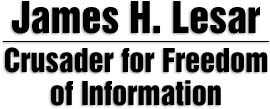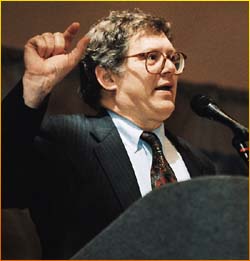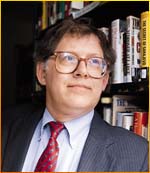


Attorney James H. Lesar has filed nearly 1,000 Freedom of Information Act requests and has obtained the release of 1 million pages of documents, primarily from the FBI and the CIA.
 or any American, it is vital to keep abreast of the workings of government. The Freedom of Information Act is an important tool to empower citizens in this regard.
or any American, it is vital to keep abreast of the workings of government. The Freedom of Information Act is an important tool to empower citizens in this regard.
For 25 years, James H. Lesar has worked to increase individual access to government information under the Freedom of Information Act. A graduate of the University of Illinois and the University of Wisconsin School of Law, Lesar is widely recognized as one of the nation’s preeminent attorneys in the Freedom of Information arena.
Lesar has filed nearly 1,000 FOIA requests himself and has obtained the release of approximately 1 million pages of documents, primarily from the FBI and the CIA.
He serves as president of the Assassination Archives and Research Center, a public service organization which he co-founded with the late Bernard (“Bud”) Fensterwald Jr. The group is dedicated to “collecting, preserving and disseminating information concerning political assassinations” and has focused primarily on the killings of John F. Kennedy and Dr. Martin Luther King Jr.


Lesar’s contributions to freedom of information and to history have been substantial.
Many of his FOIA cases have set landmark precedents, such as Allen v. U.S. Department of Defense, which established the right of a substantially prevailing FOIA requester to seek an interim award of attorney’s fees, and Summers v. U.S. Department of Justice, which held that a FOIA requester could submit an unsworn declaration to establish his identity, rather than a notarized statement.
Harold Weisberg, the U.S. Senate investigator who in 1965 wrote Whitewash: The Report on the Warren Report, told Freedom, “Without Jim, we wouldn’t know FOIA as we now know it. He fought some of the toughest cases, some of the longest. The country owes him a great debt.”
Weisberg described how Lesar represented him in efforts to obtain classified documents from the government. Lesar litigated the case, even though Weisberg was “broke and in debt,” and took it to the U.S. Supreme Court. Although they lost the case, Weisberg viewed it as a great victory because Congress cited the decision as reason to amend the Freedom of Information Act’s clause on investigatory files exemption. As a result, many FBI and CIA records became accessible.
Lesar believes that one of his greatest achievements was the release of a January 1964 Warren Commission executive session transcript that showed the commission suspected the FBI was not conducting a proper investigation into the assassination of John F. Kennedy.
Lesar also played a crucial role in the passage of the JFK Records Act, a measure spurred by the groundswell of public opinion in the wake of the popular film, “JFK” against the lack of information forthcoming from government agencies regarding the Kennedy assassination. Lesar assisted those drafting the act in Congress to formulate language which ensures greater access and liberal disclosure provisions, and also testified on behalf of the act before Congress.
According to Lesar, legislation similar to the JFK Records Act is needed to complement the Freedom of Information Act, particularly in regard to historical documents.
Lesar has been at the center of virtually every major effort to uncover documents regarding the Kennedy and King assassinations. Professor David Wrone of the University of Wisconsin Department of History described his work as “invaluable to history and to the American people.” Wrone said that Lesar has frequently labored against heavy odds, and has often stood alone, with the Freedom of Information Act as his only weapon.
Such is Lesar’s dedication to freedom of information that for years he has spent nearly half his time doing voluntary legal work for the AARC. And throughout his career, he has provided free legal assistance to many private individuals utilizing the Freedom of Information Act.
James Lesar’s efforts have helped to preserve and enhance the rights of all Americans to seek and obtain access to government files.

 ominations are invited for Freedom Magazine’s Human Rights Leadership Award. Those who have received this award have distinguished themselves through exemplary contributions to human rights. Their good works to advance the cause of Freedom serve as a model of inspiration to others.
ominations are invited for Freedom Magazine’s Human Rights Leadership Award. Those who have received this award have distinguished themselves through exemplary contributions to human rights. Their good works to advance the cause of Freedom serve as a model of inspiration to others.
Individuals are recognized in the categories of freedom of expression, freedom of information, government reform, children’s rights, mental health reform, religious freedom and social justice.
If you know of a deserving individual, Freedom wants to hear from you. Include in your proposal:
1. Your full name, address and phone number and that of the person you are nominating;
2. The person’s current job/position, as well as past positions held;
3. Specifically what the individual has done that qualifies him/her for Freedom’s Human Rights Leadership Award; and
4. Documentation to show the person’s contributions to human rights.
Send full details to:
Human Rights Leadership Awards
Freedom Magazine
6331 Hollywood Blvd., Suite 1200
Los Angeles, CA 90028-6329

